Customs and Traditions in the UAE: A Cultural Insight
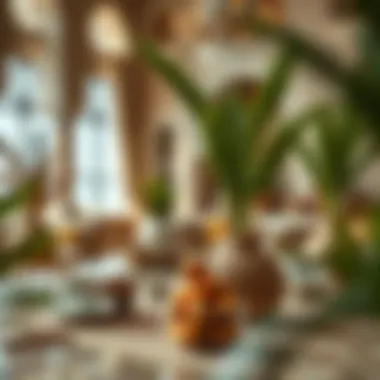
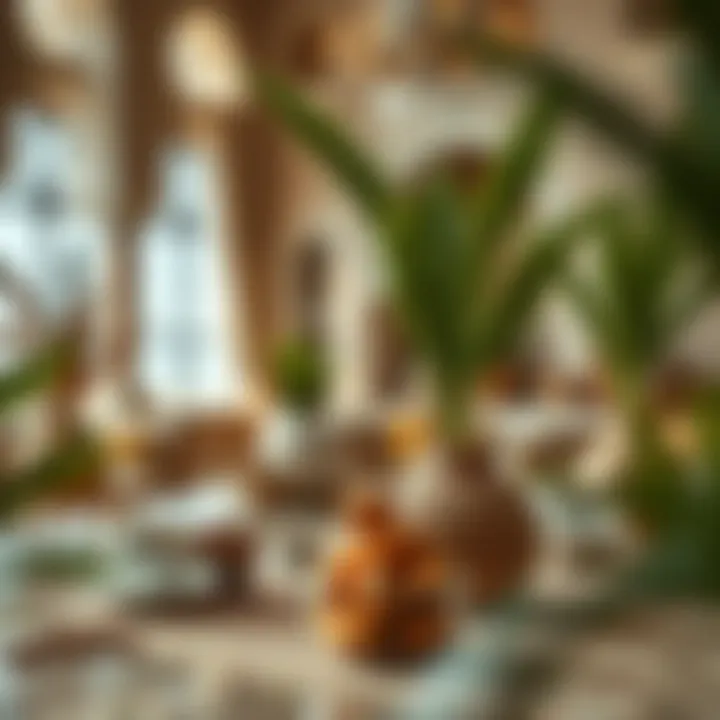
Intro
The United Arab Emirates, a blend of tradition and modernity, offers a unique cultural landscape that reflects its diverse heritage. This section aims to introduce readers to the cultural practices that shape the identity of the Emirati people. Each aspect of daily life, whether it’s the way families interact, how hospitality is expressed, or the attire worn during special occasions, plays a significant role in creating a solid connection to the past while embracing contemporary life.
Customs and traditions in the UAE are influenced by Bedouin heritage, Islamic values, and modern influences, forming a rich tapestry that informs societal norms. From the lavish hospitality extended to guests to the vibrant festivals celebrated throughout the year, the UAE's customs reveal much about the values that guide Emirati society. Here, we will explore essential elements such as family dynamics, the art of giving, traditional dress, and culinary delights that symbolize the richness of Emirati life.
Understanding these customs is crucial for anyone looking to engage with Emiratis or invest in the region. It’s not just about knowing the practices but appreciating their significance and the emotions they carry. In a rapidly changing environment, the roots of tradition provide stability, continuity, and a sense of identity.
In the following sections, we will delve deeper into these customs, illustrating their relevance in both daily interactions and during special celebrations. Each topic will illuminate how these traditions coexist and influence the modern Emirati lifestyle, presenting a comprehensive understanding of what it means to be part of this dynamic society.
Understanding Emirati Culture
Emirati culture is a beautifully woven tapestry that mirrors the history, traditions, and the everyday lives of the people in the UAE. Understanding this culture is vital for anyone looking to engage with the Emirati society, whether for business or social reasons. A grasp of customs and traditions not only helps in fostering good relations but also enriches interactions, making them more meaningful. The Emirati identity is deeply entrenched in both the past and present, with historical influences shaping modern-day practices. Recognizing these linkages allows expatriates and investors to navigate the social landscape deftly, which can be a real boon in both personal and professional contexts.
Historical Influences
The UAE's cultural foundation is built on a rich history that stretches back thousands of years. The region has been a crossroads for trade, which encouraged various influences to intermingle. Bedouin traditions, with their nomadic roots, are fundamental to Emirati identity. From storytelling to oral poetry, these traditions have crafted a sense of belonging and loyalty among the people.
Key historical influences include:
- Trade Routes: The spice and pearl trade routes allowed contact with many cultures, introducing new customs and ideas.
- Islamic Heritage: After the advent of Islam in the 7th century, religious principles became strong pillars in shaping everyday life.
- Colonial Interactions: Interactions with British and other Western powers introduced new governance ideas and influenced legal frameworks.
This complex historical backdrop has contributed to a unique cultural identity where pride in heritage is paramount. A visitor or newcomer who understands these nuances can appreciate why Emiratis uphold traditions like falconry and camel racing, reflecting the tribe's ancient past.
Modern-Day Practices
Fast forward to the present, and you'll see how Emirati culture has evolved yet retains its roots. While skyscrapers and modern markets characterize daily life, many traditions persist robustly alongside contemporary influences. This duality can be seen in various aspects of daily life, from festivals to cuisine.
Some noteworthy modern practices include:
- Balanced Blending: Many Emiratis adopt modern technology while keeping traditional values at heart. Social media platforms like Facebook or Instagram showcase Emirati culture among younger generations, allowing them to celebrate their heritage in novel ways.
- Cultural Events: Festivals such as the Abu Dhabi Film Festival and the Sharjah Heritage Days are platforms where modern expressions of art meet age-old traditions, attracting global audiences while educating them about Emirati customs.
- Culinary Fusions: Traditional dishes like Al Harees or Shawarma still dominate but now often are combined with international cuisines, showing how globalization infuses local flavors.
Understanding these modern practices is crucial for anyone looking to immerse themselves in the Emirati way of life. It's in the nuances of these daily practices that the essence of Emirati culture truly shines, blending the age-old with the new, capturing the attention and hearts of those who witness its evolution.
"The Emirati way of living is a rich reflection of their past, present, and the promising future they aim for, emphasizing the importance of community, respect, and love for land."
By having a fundamental knowledge of both historical influences and contemporary practices within Emirati culture, one can foster deeper connections that resonate well beyond just surface-level interactions.
Hospitality in the UAE
The culture of the United Arab Emirates is steeped in hospitality, where welcoming guests is not just a tradition but an essential part of daily life. The Emiratis pride themselves on their ability to host, creating an inviting atmosphere that resonates with warmth and generosity. This chapter explores the nuances of hospitality in the UAE, emphasizing how this practice reflects deep-seated values and significantly influences social interactions. Whether it is a casual visit or a formal event, the elements of hospitality shape the way people connect and engage within Emirati society.
Role of Hospitality
Hospitality in the UAE is multi-faceted and deeply rooted in the region's history. For instance, it’s not uncommon for a stranger to be invited into a local home for a cup of ghawa, a specially brewed Arabic coffee, paired with dates. This ritual stems from the belief that every guest should be treated with the utmost respect and kindness. It transcends mere politeness; it fosters a sense of community and belonging.
The importance of hospitality is especially noteworthy during significant events such as Eid celebrations, weddings, and gatherings. Here, the sheer scale of hospitality is often punctuated by elaborate feasts where traditional dishes are prepared and shared. Serving food is not just about nourishment; it is a way of expressing goodwill and maintaining relationships. A common practice involves painstaking preparation of majboos, a spiced rice dish often served with lamb or chicken, showcasing culinary skill and effort.
Moreover, hospitality in the UAE aligns with its essence as a nation of expatriates, where diverse cultural backgrounds intersect. The blending of customs not only enriches the local traditions but also creates a welcoming environment for people from all walks of life. This cultural exchange enhances mutual respect and understanding, making the UAE a fascinating place for residents and visitors alike.
Traditional Greetings
Greetings in the UAE hold significant meaning, acting as a doorway into Emirati culture. The simple act of saying hello can poignantly reflect the values of respect and friendliness. A handshake is customary, frequently accompanied by phrases like "Ahlan wa sahlan", which translates to "Welcome". This shows that the person is valued and considered an important part of the interaction.
In more traditional settings, you may witness the kissing of cheeks, particularly among men and women who are on familiar terms. This act further illustrates the bond of friendship and trust. It is essential to note that greetings can sometimes vary by region and personal preference, but the underlying principle remains consistent—hospitality and warmth are paramount.
In a business context, greetings can be slightly more formal, yet still reflect a respectful tone. Phrases like "Salam alaykum" (Peace upon you) set the scene for a friendly yet professional interaction.
Understanding these subtleties not only enriches one's experience but also lays the groundwork for fostering connections and building rapport within Emirati society. As expatriates or visitors engage with locals, appreciating the significance of hospitality and traditional greetings will pave the way for a deeper appreciation of the culture itself.
Quote: "A guest is a gift from God, and this belief is what guides hospitality in the UAE."
Family Values and Structures
Understanding family dynamics in the UAE provides a window into the intricacies of Emirati culture. Family is not simply a matter of personal relationships; it serves as the backbone of Emirati life. This section dives deep into the family values and structures that shape society and influence everyday experiences.
Family Hierarchies
In Emirati society, family hierarchies play a crucial role in maintaining order and respect. These hierarchies often follow a traditional pattern where the male figure is regarded as the head of the household. This leadership is not merely autocratic but emphasizes a sense of responsibility, guiding the family in both ethical and domestic matters. In many cases, heads of families are expected to provide not only financially but also emotionally and spiritually.
Conversely, women also hold significant roles within the family structure. Though they might not be seen as the heads, their influence is undeniable. In practice, Emirati women are often the keepers of traditions and values, ensuring that the younger generation remains connected to their heritage.
A distinctive feature of these hierarchies is the reverence afforded to elders. The saying, "The one who has been through the sands of time understands the worth of a palm tree" resonates with many. Elders often have the final say in important family matters, and their wisdom is highly regarded. It cultivates respect among family members, reinforcing bonds that withstand the test of time.
Significance of Extended Family
Extended family networks in the UAE carry considerable weight in preserving cultural identity. Unlike in many Western societies, the concept of family extends beyond just the nuclear unit. Here, uncles, aunts, cousins, and even friends may be regarded as family members. This interconnectedness adds layers of support, especially during trying times. It is not uncommon for families to pool resources to ensure the well-being of every member.
"A family that stands together, thrives together."
This saying rings especially true in the UAE, where the support systems of extended families can significantly affect personal and economic stability. Events such as weddings and funerals are community affairs, bringing together large gatherings that reinforce these vital connections. The rich traditions surrounding childbirth, marriage, and elder care also depend heavily on the extended family.
The interplay of these factors contributes significantly to the social fabric of the nation, reflecting deep-rooted values that encourage a strong sense of belonging and loyalty. Overall, family values and structures in the UAE are vital to understanding the broader customs and traditions that shape life in this fascinating country.
Traditional Dress and Attire
Traditional dress plays a vital role in the cultural identity of the United Arab Emirates. It reflects the rich heritage and social values of the Emirati people. The clothing styles are not just about aesthetics; they are imbued with significance, showcasing the blend of tradition, environment, and local customs. Understanding Emirati attire offers a glimpse into the lifestyle, values, and even the climate variations that influence choices in dress. Moreover, traditional attire is often worn during cultural events and festive occasions, reinforcing community bonds and heritage.


Male Attire
In the UAE, male attire typically consists of the kandura, a long, white garment that falls to the ankles. This piece is designed for comfort against the region's heat, reflecting a practical choice influenced by climate. The wear is often complemented by a ghutrah, or headscarf, which is usually white or red and white checkered. This not only serves a functional purpose of protection from the sun but also acts as an expression of modern elegance blended with tradition.
To elaborate, the choice of color and style can differ based on occasion or personal taste. For instance, during festive occasions like Eid, you might see men donning darker colors or even adding embroidery to their kanduras, showcasing their pride in Emirati heritage. Notably, while the basic style remains consistent, intricate variations do exist, influenced by regional preferences.
Female Attire
Women in the UAE typically wear a black abaya, a flowing robe that symbolizes modesty and sophistication. This garment is paired with a shayla, a scarf worn over the head. The abaya's design can vary significantly—from plain and simple to richly embellished with intricate designs and colorful embroidery.
This attire not only serves the purpose of modesty but also acts as a canvas for artistic expression. Many women customize their abayas, choosing fabrics that reflect personal style while adhering to cultural norms. It's not uncommon to see a woman sporting a chic abaya embellished with beads or sequins, especially during special celebrations. The choice of the abaya reflects both personal identity and the broader representation of Emirati society.
Cultural Significance of Dress
The traditional dress in the UAE is much more than just clothing; it is a visual testament to the country's history and social values. Attires serve as identifiers of cultural heritage and play a role in everyday society. Wearing traditional garments fosters unity and a sense of belonging among Emiratis. When individuals appear in their traditional dress, it establishes an immediate connection to their roots and cultural background, particularly during significant events.
Moreover, the traditional attire is deeply intertwined with religious practices, particularly among women, as modesty holds profound importance in Islamic teachings.
In essence, clothes carry messages; they tell stories of who we are, where we come from, and the values we uphold.
Ultimately, understanding Emirati dress offers valuable insights for investors and expatriates looking to navigate the rich cultural landscape of the UAE. Familiarity with these intricacies nurtures respect in business interactions and personal endeavors.
Festivals and Celebrations
Festivals and celebrations in the UAE are not merely marked days on a calendar; they are a profound expression of Emirati identity and culture. These occasions serve as a vibrant tapestry woven from the threads of tradition, history, and communal spirit. Engaging in these festivities enhances social bonding among families and communities, solidifying cultural ties. From religious observances to national celebrations, the significance of these events transcends mere enjoyment, aiming to instill pride and unity within a rapidly modernizing society.
Eid Celebrations
Eid is arguably the most significant religious festival for Muslims around the world, and in the UAE, it holds a particularly cherished place. Comprising Eid al-Fitr, which marks the end of Ramadan, and Eid al-Adha, celebrating the willingness of Ibrahim to sacrifice his son, these festivals emphasize charity, family, and community togetherness.
During Eid al-Fitr, the atmosphere buzzes with excitement as families adorn themselves in new clothes, often reflecting traditional Emirati styles. Towers of sweets, like maamoul and kahk, fill homes, symbolizing generosity and hospitality. Furthermore, the practice of giving zakat al-fitr, a charitable contribution before the Eid prayer, reinforces the communal responsibility felt among citizens. This act allows less fortunate families to partake in the celebrations, strengthening social solidarity by ensuring everyone feels included.
Eid al-Adha follows distinct customs, including the ritual sacrifice of livestock, which highlights the importance of caring for the less fortunate, sharing blessings, and honoring one's faith in a tangible manner. While children gleefully collect Eidiyah — cash gifts given by elders — adults reflect on the values of gratitude and sacrifice, key tenets of Islam. These celebrations illustrate a blend of devotion and tradition, visible in the streets adorned with lights and people greeting each other with warm wishes — creating an atmosphere rich in meaning and community spirit.
National Day Traditions
December 2nd marks the UAE National Day, a date commemorating the union of the seven emirates and the formation of the modern state. For Emiratis, this day resonates deeply as it symbolizes national pride and affection for their homeland. Across the country, celebrations are grandiose — from parades showcasing the diverse heritage to fireworks that light up the night sky.
In many Emirati households, preparations begin days in advance. Homes and streets are often draped in the UAE flag, attention to detail showing a deep-rooted sense of belonging and patriotism. Schools and community centers host events that focus on the country's progress, recounting tales of resilience and hope that resonate with inhabitants.
Traditional folk dances, such as Ayallah, are performed in public gatherings, drawing in locals and tourists alike, reflecting shared history and cultural heritage. The air fills with songs and poetry, often using classic themes of valor and pride. In essence, National Day is not just a holiday; it is a heartfelt tribute to a shared journey, celebrating milestones and future aspirations for a united Emirati identity.
Other Cultural Festivals
Apart from Eid and National Day, the UAE hosts a myriad of cultural festivals that exemplify the nation’s rich diversity. Events like the Sharjah Book Fair and the Dubai Shopping Festival bring together cultures from around the world, illustrating the UAE's status as a global crossroads.
Furthermore, the Heritage Festival provides a platform for traditional crafts and performances, aiming to preserve and promote the cultural heritage of various emirates. Folk art, poetry, and music take center stage, attracting audiences of all ages, fostering appreciation for the past while embracing modern influences. In this way, cultural festivals serve a crucial role, offering an opportunity for introspection, celebration, and joy while also ensuring an ongoing dialogue about cultural preservation.
As the nation strides forward, these celebrations ground Emiratis, reminding them of their roots while exuding kindness, warmth, and unity.
Festivals in the UAE are not only occasions for leisure, but they also strengthen societal bonds, helping to preserve Emirati heritage amid globalization.
Culinary Practices
Culinary practices are an essential thread in the fabric of Emirati culture. They not only nourish the body but also embody the rich history and social norms of the United Arab Emirates. The way food is prepared, served, and enjoyed speaks volumes about the customs and traditions that have persisted through generations. From family gatherings to public celebrations, food serves as a bridge among people, tying them together through shared flavors and experiences.
Traditional Dishes
Emirati cuisine is steeped in flavors reminiscent of its geographical context, characterized by influences from the Indian subcontinent, Persia, and even North Africa. One of the staple dishes is Al Majboos, a fragrant spiced rice dish often accompanied by meat, usually chicken or lamb. This dish is more than just a meal; it's an experience, often cooked in large pots and served communally, highlighting the importance of togetherness.
Another noteworthy dish is Harees, made from grinding wheat and mixing it with meat, slow-cooked to a creamy consistency. It's customary to enjoy this dish during Ramadan and at weddings. The method of preparation and sharing of such dishes reflects a tradition steeped in unity and celebration.
- Shawarma: While it’s globally recognized, it's a favorite street food in the UAE, found in numerous food stalls, each with their unique aroma and preparation style.
- Knafeh: A delightful dessert made from thin noodle-like pastry soaked in syrup, illustrating the Emirati love for sweets and hospitality.
Importance of Meal Times
In the UAE, the timing and manner of meals have a profound cultural significance. Meal times are often seen as sacred, as they provide an opportunity for families and friends to connect in a busy world. Breakfast is typically light, consisting of items like foul medames (stewed broad beans) or manakish (flatbreads topped with za'atar).
Lunch traditionally is the main meal, held in mid-afternoon and often starts with dates and Arabic coffee, a practice rooted in hospitality. The formalities surrounding meal times cannot be overstated: the host’s responsibility to ensure guests leave satisfied.
Dinner, usually a lighter affair, may involve family-style servings, encouraging conversation and bonding. Meals during Ramadan take a special place, breaking the fast with dates and water before moving on to larger platters of food. These rituals reflect how meal times are much more than eating; they encapsulate sharing, bonding, and cultural pride.
"In the UAE, sharing a meal is a deep-seated expression of hospitality and warmth, echoing a tradition that transcends simple nourishment."
Religion and Customs
Religion plays a pivotal role in shaping the customs and traditions of the United Arab Emirates. The UAE is predominantly an Islamic country, and the tenets of Islam permeate everyday life—from social interactions to business dealings. This section aims to shed light on how religious beliefs influence various aspects of Emirati customs.
Islamic practices serve as the backbone of a strong moral framework within the society. Customs surrounding prayer, fasting, and holy days reflect the community's collective values and priorities. For instance, during the month of Ramadan, the norms shift significantly; the workday often shortens, and the air is thick with anticipation for iftar—the meal that breaks the fast at sunset. It's a time when families gather to share not just food but also experiences and compassion, reinforcing social bonds.
Islamic Practices
Islam, as a faith, governs cultural practices in the UAE on a profound level. Daily life in the UAE sees the call to prayer echoing through the streets five times a day, signalling the faithful to pause, reflect, and dedicate time to their spirituality. This routine practice instills a sense of unity and discipline among Emiratis and expatriates alike. The significance of it cannot be overstated, as it's a reminder of the spiritual obligations that ground the community.
Religious observance goes beyond individual practice; the community tends to come together, whether in mosques or homes. Things to know about Islamic practices include:
- Prayer: Daily prayers are not just rituals but are often seen as an opportunity for reflection and community engagement.
- Zakat: The act of donating a portion of one's wealth to those in need is taken very seriously, fostering a spirit of generosity.
- Hajj: The pilgrimage to Mecca is a duty for Muslims, symbolizing a deep connection to faith and culture that many aspire to fulfill.
Impact on Daily Life
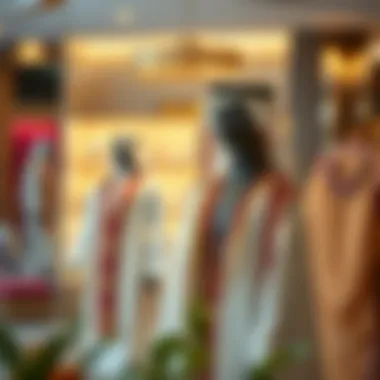

The impact of these Islamic practices extends well beyond the spiritual realm; they define social interactions and business norms in the UAE. For example, many workplaces observe flexible timings during Ramadan, allowing employees to manage their fasting correctly. Respecting this period showcases the UAE's commitment to its cultural values. Such adaptations are not merely bureaucratic; they resonate with personal respect among colleagues, fostering a cohesive work environment.
Moreover, the influence of Islamic teachings manifests in various social norms and everyday conduct. In practical terms:
- Dress Code: Attire in the UAE tends to be modest, reflecting the religious values of decency and respect.
- Alcohol Consumption: While available, it is strictly regulated, reflecting the religious beliefs surrounding its use.
- Social Interaction: Gender roles and the manner of greeting vary, often requiring an understanding of both cultural and religious context to navigate interactions smoothly.
With these practices threading through the fabric of society, the UAE exhibits a blend of tradition and modernity where Islam continues to shape a rich, vibrant culture. The customs borne from Islamic faith serve not only to uphold societal structures but also to foster a collective identity among both Emiratis and residents.
Arts and Crafts
Arts and crafts in the UAE play a vital role in underlining the intricate identity of Emirati culture. These practices reflect a deep historical context, showcasing a blend of traditional influences and modern interpretations. Engaging with the local crafts not only highlights the beauty of creativity but also serves to build connections between generations. The importance of these customs spans several domains, including preservation of cultural heritage, economic opportunities, and fostering community spirit.
Traditional Crafts
Traditional crafts in the UAE have been pivotal in shaping the narrative of its rich heritage. From intricate dhow building to the delicate art of weaving, these crafts offer a glimpse into the past. One cannot overlook the craft of pottery, where artisans create vessels that have both aesthetic and practical significance. Each piece often tells a story, reflecting the lifestyle and values of those who created them.
A few traditional crafts that stand out include:
- Al Sadu weaving: This Bedouin textile art involves weaving colorful designs using wool and is often transformed into items such as tents or decorative cushions. It’s not just artistry; it symbolizes the communal spirit of the Bedouin culture.
- Khaliji crafts: This refers to the unique styles of pottery found in the region, known for their distinct shapes and elaborate glaze.
Artisans engage in these practices with care, often passing down techniques that have been refined over centuries. The efforts of these craftspeople not only provide beautiful items but also feed the spirit of unity and connection within communities. The preservation of these arts has also opened doors to education and tourism, allowing visitors to witness the skill that goes into these creations firsthand.
Modern Artistic Expressions
In the fast-paced landscape of modern UAE, artistic expressions have evolved significantly, reflecting the changing dynamics of society. Artists today blend traditional motifs with contemporary styles, often reimagining their heritage through new techniques and media.
One noteworthy movement is Emirati contemporary art, which illustrates the life and culture of modern Emiratis. Galleries in Dubai and Abu Dhabi showcase diverse works that convey both personal narratives and societal commentary. Mediums like installation art and digital art have emerged as avenues for self-expression, and many artists utilize these platforms to tackle pressing issues such as identity, migration, and globalization.
Collaborations between artists and local communities are becoming increasingly common, fostering a collective creativity that strengthens societal bonds. For instance, the Dubai Art Season and Sharjah Art Foundation provide vital support and visibility to local talent, showcasing how art can interactively engage with the public.
The impact of these modern artistic expressions is profound; they not only enrich the cultural landscape but also contribute significantly to the economy, particularly through tourism and expatriate engagement. As art becomes a focal point of social dialogue, the UAE's cultural identity continues to evolve, embodying a vibrant blend of old and new.
"Art is a reflection of society; through it, we recognize who we are and what we stand for."
The exploration of arts and crafts in the UAE offers a comprehensive insight into Emirati life. It's clear that these traditions and their modern counterparts are not just practices—they are the very threads that weave together the rich tapestry of Emirati identity.
Language and Proverbial Wisdom
Emirati culture is steeped in a unique blend of ancient traditions and modern influences, and language serves as a cornerstone in preserving this vibrant identity. The Emirati dialects reflect the region’s history, its familial ties, and the deep-rooted customs passed down through generations. Understanding these dialects not only illuminates the cultural landscape but also promotes kinship among Emiratis and foreigners alike. Indeed, the way Emiratis communicate encapsulates their shared values and beliefs, often interlacing everyday conversations with rich historical significance.
Moreover, cultural sayings and proverbs play a vital role in Emirati life. These expressions are not merely linguistic tools but are imbued with profound wisdom. They convey essential lessons and moral values that shape social interactions and foster respect within communities. Proverbs often echo the collective experiences of the Emirati people and highlight important concepts such as hospitality, resilience, and family ties.
"Language is the roadmap of a culture. It tells you where its people come from and where they are going."
Benefits of Engaging with Emirati Language and Wisdom
- Enhances communication with locals, deepening relationships.
- Provides insights into local customs and traditions.
- Fosters appreciation for the Emirati heritage, enriching one's visit or residency in the UAE.
A vital part of the Emirati experience lies in understanding the nuances of dialects, which vary greatly across the region. Local expressions often differ from Standard Arabic, showcasing the unique influences of trade, migration, and historical interactions with neighboring cultures. To truly grasp the essence of Emirati society, one must lean into the language used in daily life.
In summary, the language and proverbial wisdom of the UAE are not just about words but about building bridges between past and present. Embracing these elements provides a comprehensive glimpse into the Emirati way of life, making it pivotal for anyone looking to immerse themselves in this rich culture.
Impact of Globalization
The concept of globalization is a double-edged sword, especially in a rapidly evolving tapestry like that of the UAE. While it opens up avenues for cultural interchange, economic partnerships, and diverse social interactions, it also presents challenges to traditional customs and societal structures. The UAE, straddling the line between rich heritage and modern advances, exhibits how globalization shapes and sometimes reshapes a nation’s identity.
One of the most significant elements of globalization in the UAE is the influx of expatriates from around the world. expatriate communities bring along their customs, languages, and cuisines, creating a melting pot of cultures. This exchange enriches the Emirati culture, leading to innovative fusion cuisines and hybrid celebrations.
For example, during Ramadan, it’s not only Emirati dishes that grace the Iftar table. Various international cuisines are often incorporated, showcasing the culinary diversity that globalization fosters. Here are some specific benefits of this cultural mix:
- Enriched Culinary Experience: Access to different flavors encourages Emirati chefs to experiment with global dishes, leading to unique gastronomy.
- Broadened Perspectives: Emiratis participate in various cultural celebrations introduced by their expatriate neighbors, fostering understanding and cultural solidarity.
However, this exchange is not without its complications. The challenge lies in maintaining core values while embracing diversity.
Cultural Exchange
Under the umbrella of globalization, cultural exchange has become a hallmark of life in the UAE. The country’s myriad of cultural events, exhibitions, and festivals is a direct response to this global interconnectedness. For instance, the Sharjah International Book Fair and Abu Dhabi Art not only showcase local talent but also host international artists and authors. The intermingling of ideas, artistic expressions, and literature has created a vibrant cultural scene that resonates with both locals and visitors alike.
The introduction of international education programs has also played a pivotal role in cultural exchange. Schools and universities across the UAE offer diverse curriculums, allowing Emirati students to learn from global educators. This not only promotes a wider knowledge base but also helps Emiratis acquire a global mindset, crucial in today’s interconnected world.
- Examples of Cultural Exchange:
- The Dubai Shopping Festival, where various cultures are represented in dance, music, and food.
- Collaborative art installations that fuse traditional Emirati motifs with contemporary styles from outside the region.
Maintaining Heritage
Despite the melting pot of cultures, the UAE actively emphasizes the need for maintaining heritage amidst the wave of globalization. Protecting cultural identity while encouraging progress is a delicate balance that the Emirati government prioritizes. Various initiatives, such as the National Archive and restoration projects for historical sites, highlight the importance of preserving heritage.
The efforts to revive traditional crafts, such as weaving and pottery, serve as both a nod to the past and a practical approach to provide livelihoods for local artisans. Programs that promote local storytelling, poetry, and traditional music amplify the voices of the past in the present.
- Strategies for Heritage Preservation:
- Government-funded educational programs that focus on teaching youth about Emirati history and traditions.
- Regular cultural festivals that invite local and international practitioners to showcase their crafts, ensuring continuous visibility.
Legal and Social Norms
Legal and social norms in the UAE are more than mere rules; they're the framework that holds the vibrant tapestry of Emirati society together. They guide behavior and shape relationships, providing a sense of order in a rapidly modernizing landscape. Understanding these norms is crucial for anyone wanting to navigate the intricacies of life in the Emirates, whether you're an expatriate or an investor.
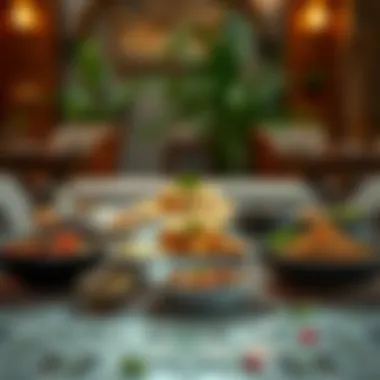
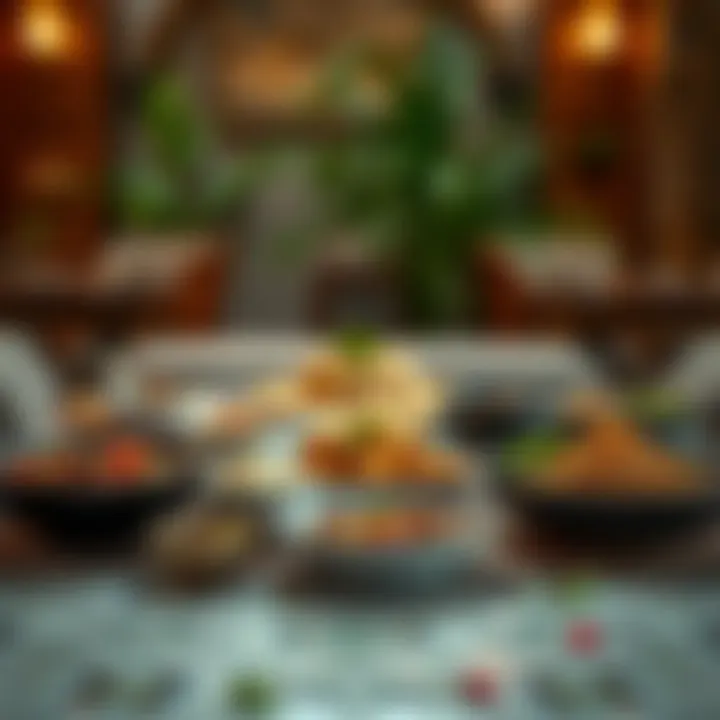
Understanding Emirati Laws
The legal system in the UAE is a blend of Islamic law and civil law. Each emirate operates with its own rules, making it essential to know the specifics, especially if you're planning to live or work there. For instance, Dubai has its own set of regulations relating to business practices and real estate, while Abu Dhabi, being the capital, enforces laws that may differ significantly.
Common legal aspects to keep in mind include:
- Respect for Islamic Law: As a predominantly Muslim country, many laws are derived from Islamic principles. This affects aspects like public behavior, dress code, and dietary restrictions.
- Business Operations: The UAE encourages foreign investment through free zones, but there are stipulations. For example, majority ownership by a UAE national is a must unless in a designated free zone.
- Criminal Code: Violations can lead to severe penalties including fines, imprisonment, or deportation. Understanding what constitutes a crime, especially around topics like alcohol consumption or public displays of affection, is vital.
As strange as it may sound to some, laws extending to social media activity exist here. Cybercrime laws in the UAE are strict, and sharing anything deemed offensive can lead to serious consequences. Keeping the legal landscape in mind provides a substantial advantage for residents and visitors alike.
Social Etiquette
Emirati social etiquette is the glue that binds people together, transcending legalities and putting an emphasis on respect and understanding. Whether you’re dining with locals or attending a business meeting, being aware of social customs can make a world of difference. Here are a few key points to consider:
- Greeting: A common greeting among Emiratis is "As-salamu alaykum," meaning "Peace be upon you.” A handshake is customary, but it's important to let women initiate contact first.
- Dining Practices: If invited to an Emirati home, expect to eat with your right hand, as the left is considered unclean. Elders are often served first, demonstrating respect for age.
- Dress Code: Modesty is key in the UAE, particularly in public spaces. Women should cover their shoulders and knees, while men typically wear long trousers. When in doubt, err on the side of formality.
"Understanding local customs can turn a simple visit into a rewarding cultural exchange."
In short, being attuned to the legal and social norms in the UAE can greatly enhance your experience here. This awareness paves the way for meaningful relationships, respectful interactions, and ultimately, a smoother journey in this beautiful, diverse nation.
The Role of Women in Emirati Society
In a swiftly evolving context like the UAE, one can hardly overlook the significant metamorphosis concerning the role of women. Their status and contributions act as a mirror, reflecting both the achievements and the challenges faced in a society that harmoniously balances tradition with modernization. With the UAE's rapid development over recent decades, women have stepped into various arenas once dominated by men, showcasing their capabilities in a multitude of sectors from business to governance.
Women in Leadership
Women in leadership roles within the UAE are making strides, marking a robust presence in various industries. The government encourages female participation through policies aimed at enhancing their status in the workforce. According to a report by the UAE Gender Balance Council, over 27% of government leadership positions are held by women. This statistic is vital, considering the global average hovers around 23%.
One standout example is Sheikha Lubna Al Qasimi, a trailblazer who previously served as the Minister of Foreign Trade and was the first female cabinet member in the UAE. Her journey is a testimony to the growing acceptance and empowerment of women in the public domain. Other women like Huda Bint Mohamed Al Hashimi, the Assistant to the Cabinet for Strategy and Future, highlight how women are not just participants but key players in shaping the nation's forward motion.
Moreover, initiatives such as the Emirati Women’s Day celebrate and acknowledge the vital roles women play, both in the professional world and within their communities. This celebration fosters a feeling of unity among women, encouraging them to pursue their aspirations.
Cultural Expectations
In any culture, expectations significantly shape individuals' roles, and the UAE is no exception. Emirati women traditionally hold a dual role: preservers of heritage and active contributors to society. While there are many advancements in women's rights, some cultural expectations still influence social behavior and norms.
For instance, family remains a cornerstone for Emirati women. The expectations to prioritize family, particularly in child-rearing, often come alongside their career pursuits. This balancing act embodies the spirit of many Emirati women, who strive to fulfill familial obligations while fostering their careers.
However, the stereotype that women should confine themselves to domestic roles is gradually being dismantled. Education plays a crucial part in this shift. With more ladies pursuing higher education, the tide is turning. Universities in the UAE boast a female enrollment rate nearing 70%, demonstrating a commitment to expanding horizons beyond usual cultural expectations.
In summary, the role of women in Emirati society exemplifies a delicate interplay between tradition and modernity. From leadership to cultural expectations, Emirati women are crafting a narrative filled with empowerment and resilience, inspiring future generations. Their journey reflects the broader spectrum of Emirati culture, where change is both embraced and respected.
"Empowerment of women leads to the advancement of all of society." - UAE Gender Balance Council
For further insights, one may look into resources like UAE Gender Balance Council or read in more depth on platforms such as Wikipedia on Women in the UAE.
Cultural Preservation Efforts
Cultural preservation is crucial to maintaining the unique customs and traditions that define the Emirati identity. In an ever-globalizing world, where cultures often intermingle and sometimes lose their distinctiveness, the UAE takes significant measures to uphold its heritage. This not only fosters pride among Emiratis but also educates expatriates and visitors about the rich tapestry of life in the region.
Preserving culture has numerous benefits. It promotes social cohesion among Emiratis by reinforcing shared values and traditions, which might otherwise be diluted. These efforts also help sustain the linguistic, artistic, and culinary legacies that are intrinsic to the Emirati experience. Preservation not only safeguards the past but also serves as a blueprint for future generations, ensuring that they remain connected to their roots.
Restoration Projects
One significant effort in cultural preservation is the various restoration projects that have been initiated across the UAE. These projects often involve the careful rehabilitation of historical sites, museums, and traditional architecture, all of which are vital in keeping the past alive. Places like the Al Fahidi Historical Neighborhood in Dubai have been intricately restored to reflect the typical architectural style of the region.
"Restoration projects are not merely about bricks and mortar; they are about restoring a sense of identity and place for the community."
Among the notable restoration efforts is the Qasr Al Hosn fort, the oldest stone building in Abu Dhabi. This restoration reintroduces the significance of the fort as a cultural symbol to both locals and tourists, providing more than just aesthetic value—it's a window into the Emirati way of life at the time when it was first built.
Education and Awareness
Education plays a pivotal role in cultural preservation in the UAE. Public awareness campaigns aim to engage the younger generations through schools and community programs, focusing on Emirati history, customs, and arts. Events such as heritage festivals have been established to provide immersive experiences for both Emiratis and expats, showcasing traditional crafts, music, and dance forms.
Moreover, many universities now offer specialized programs and degrees focusing on heritage studies, enabling students to explore the nuances of Emirati culture more deeply. Understanding the importance of these cultural elements can help bridge gaps between diverse populations living in the UAE.
The UAE also benefits from the tireless work of institutions like the Sheikh Mohammed Centre for Cultural Understanding, which aims to improve cross-cultural communication and foster understanding among the different communities residing in the nation. They provide educational programs that highlight the cultural significance of traditional Emirati customs.
Through restoration and education, the UAE is actively working to preserve its customs and traditions, ensuring they remain vibrant and relevant in days to come.
Finale: The Tapestry of Emirati Culture
In wrapping up our exploration of the customs and traditions prevalent in the UAE, it becomes clear that Emirati culture is not a monolithic entity but rather a harmonious tapestry woven from various threads. Each aspect discussed in the article—hospitality, family values, traditional dress, festivals, culinary practices, and more—contributes to a rich cultural landscape that reflects both the influences of history and the dynamism of modern life.
Importance of Cultural Elements
One of the striking features of Emirati culture is its strong sense of hospitality, a value that transcends social and economic boundaries. The practice of welcoming guests with open arms lays the foundation for friendships and connections among diverse communities, shaping the very fabric of everyday life in the UAE.
Moreover, family plays an indispensable role, forming the backbone of Emirati society. Extended families often live together or maintain close ties, reinforcing the importance of familial support and loyalty. This structure not only nurtures emotional bonds but also preserves cultural heritage, allowing traditions to be passed down through generations.
Benefits of Understanding
For expatriates and investors alike, grasping these cultural nuances is vital. It aids in fostering respectful relationships and understanding social cues. Being aware of local customs can make a significant difference in interactions, whether in a business meeting or a social gathering. Recognizing the significance of events like Eid or National Day can facilitate deeper connections with Emirati colleagues and neighbors.
Synthesizing the Information
In essence, the customs and traditions of the UAE serve as a lens through which one can view the dynamism of Emirati life. The intertwining of traditional practices with contemporary influences reflects a society that respects its past while eagerly embracing the future. It is within this balance that the true essence of Emirati culture resides, offering not just a way of life but also a model of coexistence amid diversity.
Final Thoughts
Understanding this intricate tapestry is more than an academic exercise; it's a bridge to building relationships and fostering mutual respect in an increasingly globalized world. The UAE stands as a testament to the celebration of diversity, where various cultures meet and enrich each other, creating a unique collective identity that is continuously evolving.
"Culture is not just what we do; it’s who we are. By understanding the customs and traditions of another culture, we learn about our shared human experience."
This comprehensive look offers a blend of appreciation and wisdom that can aid anyone looking to navigate the complexities of Emirati society.











